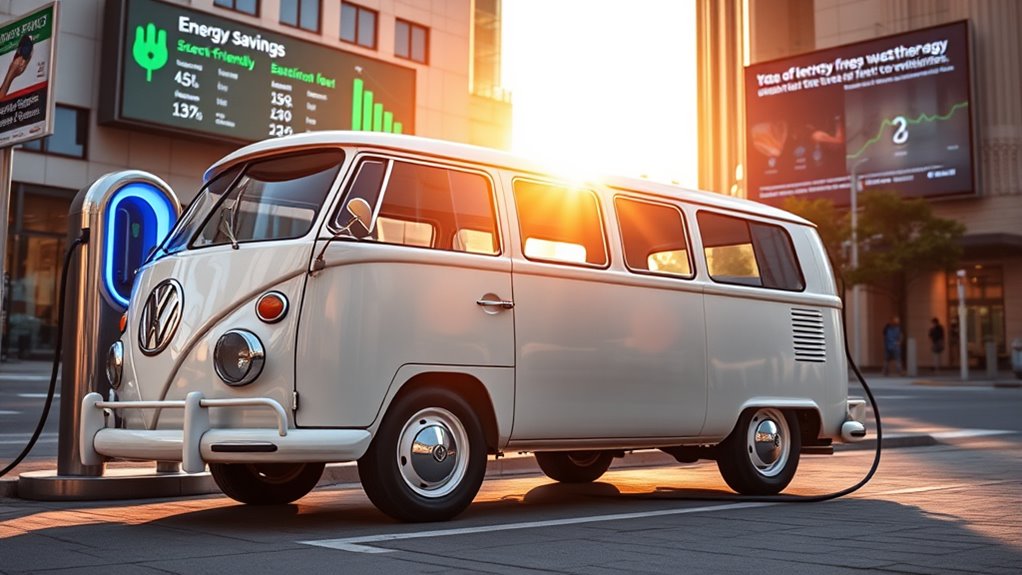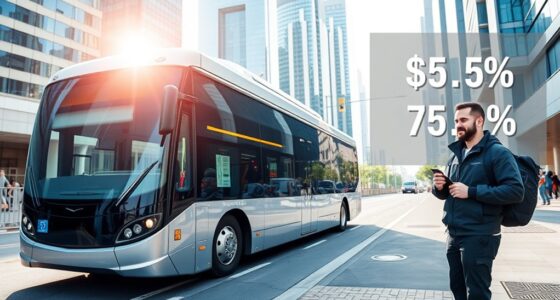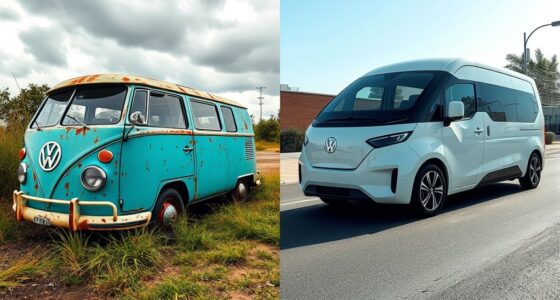Switching to an electric VW Bus can cut your fuel costs considerably since electricity is cheaper than gas, and you save time with fewer refueling stops. Maintenance costs drop because electric vehicles have fewer moving parts and need less frequent repairs, especially without oil changes. Home chargers and fast public stations add convenience and savings. Over time, these benefits can lead to substantial long-term savings. To discover more about maximizing your savings, keep exploring these options.
Key Takeaways
- Electric VW Buses significantly reduce fuel costs by relying on cheaper electricity instead of gasoline.
- Lower maintenance needs of electric vehicles decrease ongoing service expenses over time.
- Home charging with off-peak rates offers convenient, cost-effective recharging, saving money compared to public charging.
- Fast chargers enable quick top-ups during trips, minimizing downtime and associated costs.
- Overall, electric VW Buses can deliver substantial long-term savings on fuel, maintenance, and charging compared to traditional gas-powered buses.

Switching to an electric VW Bus can notably lower your running costs and save you money in the long run. Unlike traditional gasoline models, electric vehicles (EVs) rely on electricity, which is generally cheaper than fuel. This shift means fewer trips to the pump and more money staying in your pocket. Charging stations are becoming more accessible, making it easier to keep your bus powered without the hassle of searching for fuel. Public charging networks are expanding, and many workplaces and shopping centers now offer fast chargers, so you can top up quickly during errands or work hours. This convenience means you won’t need to plan your trips around fueling stops as much, saving you time and reducing fuel expenses.
When it comes to maintenance costs, electric VW Buses are simpler and cheaper to service than their gas-powered counterparts. You won’t need oil changes, spark plug replacements, or exhaust system repairs. The electric motor has fewer moving parts, markedly reducing the likelihood of breakdowns and the need for costly repairs. Over time, these savings add up, making your overall ownership costs much lower. However, it’s important to weigh the costs associated with maintaining the battery and charging system. While these tend to be less frequent than traditional maintenance, battery replacements can be pricey if needed after many years of use. Still, advances in battery technology and warranties often mitigate these costs, and many owners find that the lower maintenance expenses more than compensate for them.
Charging your electric VW Bus at home can further cut costs, especially if you have a dedicated charging station installed. Home chargers are convenient and can be more economical than public charging, especially if you take advantage of off-peak electricity rates. Using a charging station regularly means you can keep your bus powered overnight, ready for your daily commute or trips without needing to visit a gas station. Plus, with the increasing availability of fast chargers, long trips become more feasible, and the expense of rapid charging is often comparable to or less than filling up with gas, depending on local electricity rates. Additionally, investing in Porsche Tuning Brands for your electric vehicle can optimize performance and efficiency, further enhancing your savings and driving experience.
Frequently Asked Questions
How Long Does the Battery Last Before Needing Replacement?
You’re wondering about battery longevity for your electric VW Bus. Typically, the battery lasts between 8 to 10 years or about 100,000 to 150,000 miles before needing replacement. Replacement costs can vary but usually range from $5,000 to $8,000. Proper maintenance and avoiding extreme temperatures can extend your battery’s life, helping you delay costly replacements and keep your electric bus running smoothly longer.
What Is the Environmental Impact of Manufacturing the Electric VW Bus?
When considering the environmental impact of manufacturing the electric VW Bus, you should know that manufacturing emissions are higher initially due to resource extraction and battery production. These processes require mining and processing raw materials like lithium and cobalt, which can have significant environmental effects. However, over time, the lower emissions during usage help offset these initial impacts, making it a more sustainable choice compared to traditional vehicles.
Are There Government Incentives for Purchasing an Electric VW Bus?
You may be eligible for government incentives and tax credits when purchasing an electric VW Bus. These programs aim to promote eco-friendly transportation and can substantially reduce your overall costs. Be sure to check with local, state, or federal agencies, as incentives vary by location. Taking advantage of these incentives can make switching to an electric VW Bus more affordable and environmentally beneficial for you.
How Does Climate Affect the Electric VW Bus’S Range?
Climate effects can substantially impact your electric VW Bus’s range. Cold weather causes battery efficiency to drop, leading to range variability, so you might not get as far as expected during winter. Hot temperatures can also reduce range due to increased energy use for cooling. You’ll notice these climate effects more in extreme conditions, so plan your trips accordingly to guarantee your bus’s range stays reliable no matter the season.
Can the Electric VW Bus Be Charged at Standard Home Outlets?
Ever wondered if you can juice up your electric VW Bus at home? The answer is yes, but with a twist. Home charging depends on outlet compatibility—most standard outlets, like a regular 120V socket, can charge your bus, but it’ll take longer. For faster charging, you might need a dedicated 240V outlet. So, yes, you can charge at home, but the speed and convenience vary.
Conclusion
Switching to an electric VW Bus can save you about $800 annually on fuel and electricity costs alone. Imagine cutting your transportation expenses by nearly 60% compared to a traditional gas-powered vehicle. That’s like getting a free month of driving every year! With such significant savings and eco-friendly benefits, making the switch isn’t just good for the planet—it’s smart for your wallet too. So, are you ready to hit the road in your electric VW Bus?









